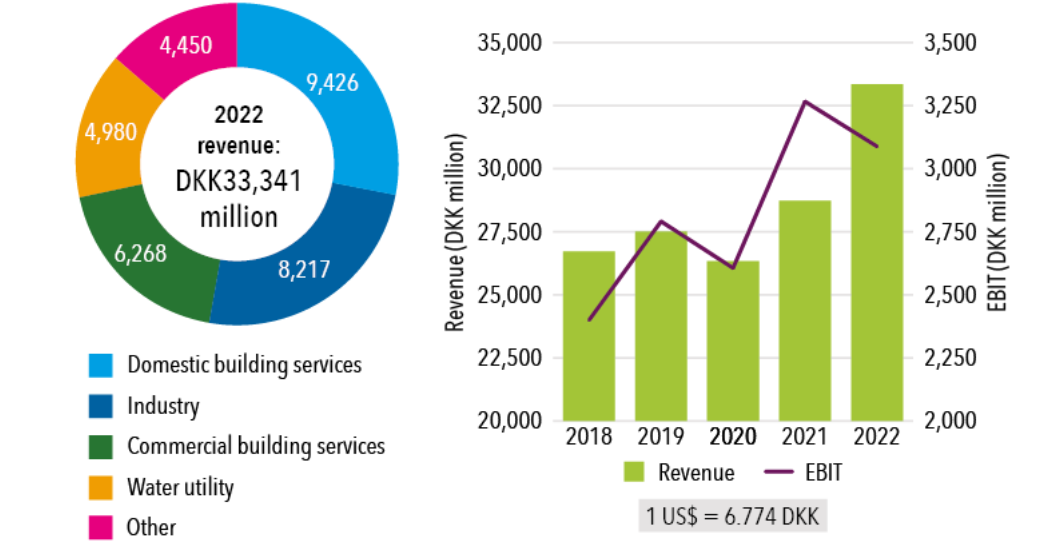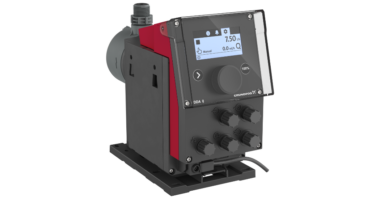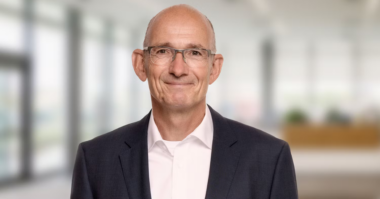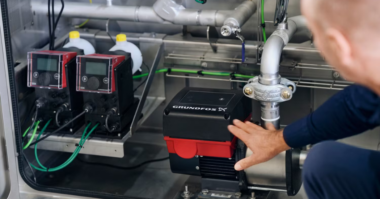Grundfos CEO Poul Due Jensen has brought on board industry veterans HP Nanda and Ralph Exton to spearhead the growth of its water utility division, and now he is seeking significant outcomes.
Grundfos, the world’s largest pump manufacturer, is looking for accelerated growth in the water utility market after a major restructuring and the recruitment of a new leadership team. The objective is to make Grundfos more than a pump company, seizing the opportunity in digital technology to change the paradigm for water distribution and wastewater collection.
The strategy is being driven by CEO Poul Due Jensen, who took over the reins of the company in October 2020. The restructuring has seen the company redivided into four divisions defined by their customer focus: commercial building services, domestic building services, industrial, and utility. “It is the biggest organisational transformation in 75 years,” Due Jensen told GWI.

Grundfos started out making groundwater pumps for irrigation, before developing efficient circulator pumps for domestic central heating systems and becoming a global giant. Its foundation ownership structure ensures that it is well placed to reinvest its profits for growth. In January 2022, CEO Poul Due Jensen initiated a new organizational structure around four global operating divisions.
Over the past two years, the industrial market has attracted the most attention. The acquisitions of EuroWater, MECO, and Waterworks have taken Grundfos beyond pumps into water treatment. “We still need to grow in the industrial water treatment sector to become the player we want to be,” Due Jensen remarked. The decision to expand the industrial business was driven primarily by the impact Grundfos can have in delivering greater sustainability through water reuse and energy efficiency.
“We have some very strong values,” Due Jensen explained. “A lot of companies say they have got strong values, but I think it is the way we are living them that makes us unique. It’s not just about having this commercial approach and about selling more and more pumps. It’s actually about making a difference to the world and the fact that we can give back. It’s something that is deep.”
This belief in making a better world is also driving the company’s investment in the water and wastewater utility sector. “It’s a business that we have tried for a couple of years, and we’ve done some strategic moves, and now we want to put even more fire and energy into it in order to succeed.” Some of that fire and energy is expected to come from two leadership appointments made last year. HP Nanda joined from DuPont to become CEO of Grundfos Water Utility, while GE Water and Suez WTS veteran Ralph Exton is now the division’s chief marketing officer. Both have a strong background in advanced industrial water treatment, and very little experience of moving water around for municipal utilities. So why did they see an opportunity in Grundfos?
Nanda was attracted to the job because of Grundfos’s values. “I rarely see a company’s website which will have the audacity and courage to state publicly that profit is a means to a goal,” he said. “It is not a goal in itself. Doing good for the world is possible because we are profitable.” He was also impressed by the company’s inclusiveness. 3-5% of the workforce are “flex workers” who suffer from some neurological or physical disability.
Besides Grundfos’s values, Nanda was also excited by its potential for growth. “Water Utility can really be the place which drives the transformation of Grundfos. Within the four divisions, it is the one that is closest to the customer. I personally believe that digital is the future. If you can interact directly with customers, you can embed digital to solve problems. You do not go through the challenge of value proposition and loss in the sales channel. You can speak one-to-one and you can solve it.”
Nanda is also attracted to the potential to drive sustainability by changing the paradigm for pumping systems. “What has been the tradition is that we deliver a gigantic pump with massive energy consumption because the last point on the network has to have pressure,” he said. “That is a 17th-century concept. In the 21st century, I could have a much smaller pump just pressurized enough to go the distance, and another smaller pump, and another. Connect all the smaller pumps digitally across the network, and I can measure pressure versus demand. That is demand-driven distribution. We have developed the software with the sensors. Our biggest success stories are in Italy. We have demonstrated 35% fewer pipe breaks, 25% less energy, and 15% fewer issues about loss.”
Nanda said he believes that the key challenge for Grundfos is changing the way it sells into the municipal sector, as this new paradigm entails a much broader engagement with the utility than was the case in the past. Short pay-back periods should make it an easy sell, however. “I was at one of the leading utilities in the UK,” he remembers. “They have something like 2,000 pumping stations. Some of the pumps are 30 years old. If you take out one pump and you put in a modern pump, the payback period is eight or nine months, because the energy costs are super-high. They have to decarbonize themselves anyway because that’s their commitment. We can be the enabler and the partner to make this happen.”
Nanda also sees a big opportunity to change the paradigm in wastewater collection and transportation. “Bringing a digital solution will improve predictability. Then, because we have digital solutions, we can work to prevent [sewage spills].”
Like Nanda, Exton was attracted to Grundfos by the company’s values and its digital potential. “What interested me the most was one of the conversations I had with Poul. He said: ‘We aspire to be known as something more than just a pump company.’ He was very open and eager to transform into a new company, into a new direction. That was exciting for me, because that took me back to those GE days where we truly were transforming the business into something different than it originally was.” With his background in industrial water, where customers are happy to sole-source the most innovative solutions, how will Exton cope with the much more heavily regulated municipal procurement process? He pointed out the different rules that apply to network and treatment plant spending, saying: “They have a little more freedom to keep things moving. So instead of doing a capital install of a new plant, which is highly regulated, they are in more of an emergency, ‘got to get it done’ mode. They can move faster through the procurement process.”
Due Jensen is confident of Grundfos’s place in the future, despite the fact that others see the pumps business as becoming commoditized. “We will not be a me-too player – ever. We constantly try to add value to the customers, otherwise, we could easily be a dying breed. So we need to continue to differentiate on technologies, or else it’s going to be very difficult. We are sleeping with our boots on, as a matter of fact, because it can happen. If something happens, we want to be the one to disrupt our own business.”
CEO POUL DUE JENSEN
Poul Due Jensen is the grandson and namesake of the man who founded Grundfos in 1945. In 1975 the elder Due Jensen transferred 90% of his shares to the Poul Due Jensen Foundation. The foundation’s objective is to ensure the healthy development of Grundfos. “He didn’t want anyone to ruin his dream – not the family, not other stakeholders,” the younger Due Jensen explains. An employee share scheme means that 2.8% of the company’s shares are now owned by the staff. The family continues to hold 9.6% of the shares.




